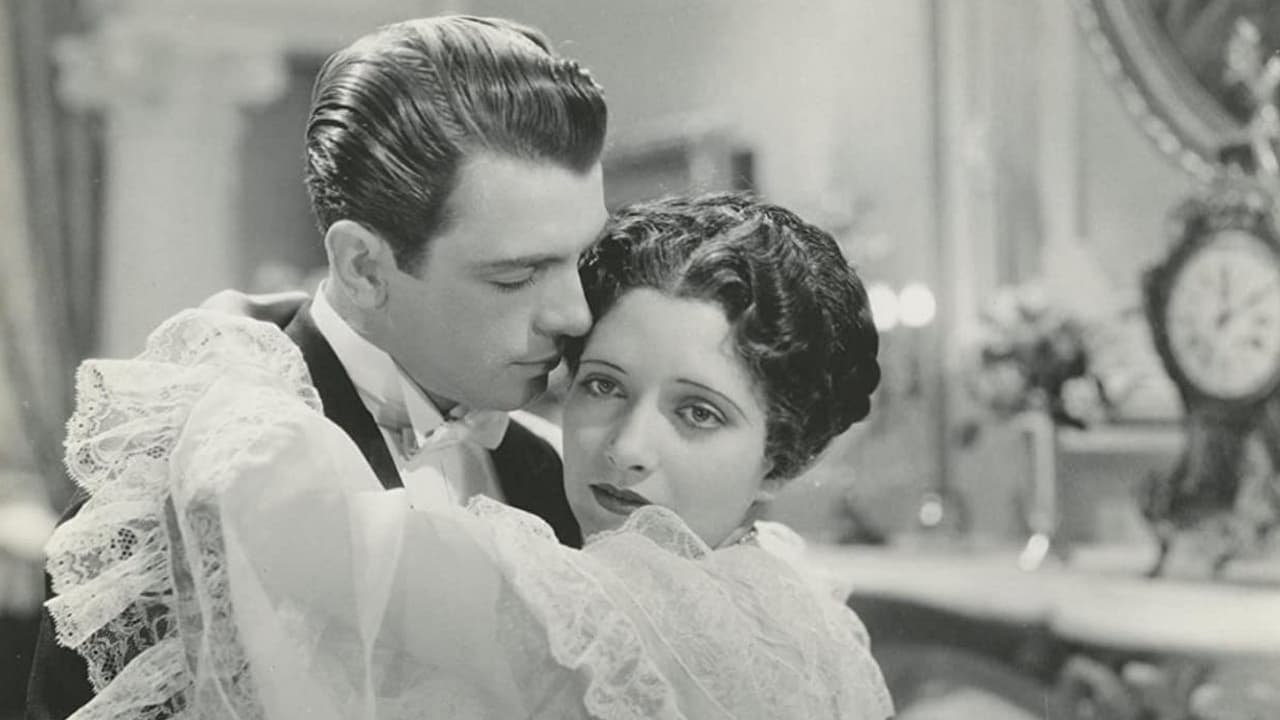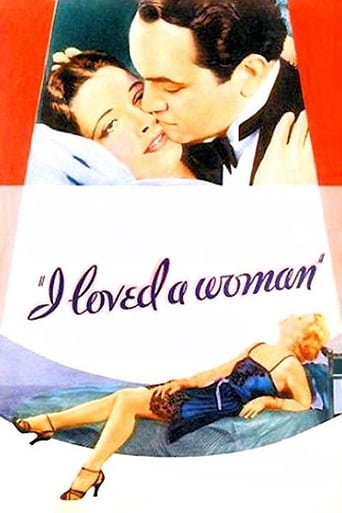Smartorhypo
Highly Overrated But Still Good
Tacticalin
An absolute waste of money
Lachlan Coulson
This is a gorgeous movie made by a gorgeous spirit.
Darin
One of the film's great tricks is that, for a time, you think it will go down a rabbit hole of unrealistic glorification.
bkoganbing
Some plot strains from Citizen Kane are present in this melodrama involving meatpacking tycoon Edward G. Robinson who is married to Genevieve Tobin but his heart belongs to opera singing Kay Francis. Would that I Loved A Woman were as good as the Orson Welles masterpiece.Robinson ages over 30 years in I Loved A Woman. When we first meet him he's a young art student on the holiday in Europe that rich young men had back in the day. That's when he hears his father has died and comes home to take over the business.He becomes the Donald Trump of the meatpacking industry in the 1890s. In the famous tainted beef case of the Spanish American War he skates on that when Theodore Roosevelt can't bust the meat trust. But it's his personal life that this film is concerned with.He marries Tobin, daughter of rival Robert Barrat, but as he eclipses Barrat in standing in the industry he finds she married him for social standing and to bring his business into dad's fold. It works the other way around however. Like Charles Foster Kane he finds a Susan Alexander with another aspiring singer Kay Francis. Naturally it's a given with me that Kay's voice was dubbed, but why would an aspiring opera singer be rehearing with Home On The Range?In any Kay let's him down as well and soon things in the business world go bad on him. Let's just say Robinson made some bad business decisions and overextended himself.British actor E.J. Ratcliffe plays Theodore Roosevelt in a brief scene with Robinson. He does his best, but when TR succeeded William McKinley TR was 42 years almost 43 our still youngest president. The 70 year old Ratcliffe was ridiculous in the part. In fact the whole story about TR's involvement in the scandal about the tainted beef is all wrong.In the Citadel Film series book on the films of Edward G. Robinson we learn he wasn't happy with the script and story. Seeing what I saw I couldn't blame him. In fact no one in the cast look like they took it all too seriously.
audiemurph
This film is a rollicking tour-de-force that has as its primary focus the incredible acting talents of the incomparable Edward G. Robinson. Robinson takes us on a roller-coaster of a ride, as he sails back and forth from joy and elation to depression and pathos and back again. It is sometimes dizzying trying to keep up with the swinging emotions of Robinson's multi-millionaire meat-packer John Hayden. Robinson carries it off beautifully, and I think this film really proves what a fine, fine actor he was.And how lucky we are that a film company like First National existed in the early 30's, pumping out films with stars like EG Robinson at a rate that would leave a current studio breathless. What an exciting time it must have been. We are the beneficiaries of this fascinating time, when studios had to release new films in a rapid succession, such was the hunger for new films."I Loved a Woman" takes place over a 40 year period, taking us from late Victorian Chicago of 1892 to industrial Chicago of just a few decades later. The fashions change subtly over the 90 minutes this film takes. While some of the romantic scenes with Kay Francis are a bit dated, and the lovers' dialogue a little stilted, Robinson never fails to captivate us when he is on screen. If anybody can carry this stuff off, it is him (Robinson even sings in this movie, though happily not too much).The supporting cast is strong and full of First National perennials, such as Robert Barrat, playing EGR's father-in-law. A special treat is the speaking appearance of one of John Ford's silent screen favorites, J. Farrel MacDonald.This movie also features a speaking role for Theodore Roosevelt, who personally threatens to destroy the meat packer Hayden for selling rotten meat to the soldiers of the Spanish-American War.Perhaps the only annoyance is having to put up with Kay Francis repeatedly singing Home on the Range in an opera voice while playing an upright piano. Once, maybe, but three times?....One funny thing to look for early in the film: Robinson returns home from abroad after hearing of his father's death. A painting of dad hangs on the office wall - looking exactly like EG Robinson with full whiskers! A very nice touch.This is a strong entry from First National Films, and a great way to get know the many sides of Edward G. Robinson. I highly recommend this one.
Michael_Elliott
I Loved a Woman (1933) * (out of 4) John Hayden (Edward G. Robinson), an art lover staying in Greece, receives word that his father has died so he returns to Chicago to take over the family meat packing business. Hayden sticks fast to his morals of running a good, clean business until the day he meets an opera singer (Kay Francis) and decides to do whatever it takes to make money to keep her happy. If you own a Leonard Maltin movie guide then you know it's quite rare for an older film from this era to receive a BOMB rating. If you go through every single page you'll notice that very few receive such a bad rating but this is a film that does get that. Even though I didn't find it that bad there's still no question that this is one of the worst from Hollywood's golden age. I guess the first place to start is the fact that this thing moves as slow as molasses. At 91-miutes the film seems three times as long and I couldn't help but feel as if I was watching two or three moves rolled into one. I say that because by the time you're at the thirty-minute mark you've already forgotten everything that happened previously. You hit the hour mark, bored out of your mind, and you're shocked to realize how much has happened in the film and how much you don't care. The film takes place in the late 1890s and you go through various things from a marriage to a childhood sweetheart (Genevieve Tobin) to the affair with the singer. The big turning point in the film has Robinson being too good of a nice guy and then out of no where he's an evil, money hungry idiot who kills some American soldiers without feeling bad. This turn in Robinson's character is never explained and how it comes off is unintentionally hilarious. The performances really aren't all that memorable, although they do contain some camp value. Francis is OK in her part but you can't help but laugh when it comes time for the singing. Tobin is unintentionally funny playing the wife who has her own ideas of revenge. Robinson isn't too bad here but you really have a hard time believing that he's a lover of art. I also didn't buy his transformation into the bad guy but then again the screenplay can be blamed for this. As bad as I LOVED A WOMAN is, it's almost hard not to recommend it to film buffs just so they can see how bad it actually is.
marc
Forgotten epic of a meat packer played well by Edward G. Robinson who takes over his fathers business and becomes ruthless.I agree with the previous reviewer who complained about the many holes in the plot and inconsistencies- Robinson is first presented as a lover of humanity and the arts. He has a complete personality switch and becomes a ruthless, amoral business man all because of a little Machiavellian advice from lover Francis.That said, the movie is interesting, well produced, historically accurate in a lot of ways and finally quite moving as Robinson ends up alone, back in his beloved Greece but afflicted with dementia so the events of his life become momentary snapshots that come and go.I also liked the portrayal of the deterioration of his marriage. As in many 30's movies, there is a lot of truth that is hinted at but not fully explored.Sometimes, this leads to a superficiality which is unsatisfying but sometimes it leads to motifs that suggest subtly the inner workings and leave it up to us to connect the dots.

